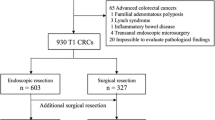Abstract
Background
Data on the prognostic factors of survival and recurrence in patients with colorectal cancers confined to the bowel wall (T1 and T2) are limited. The aim of the present study was to determine factors that might predict the survival and recurrence of patients who had T1 and T2 colorectal cancers.
Patients and Methods
All patients with T1 or T2 colorectal cancers who underwent resection in the Department of Surgery, University of Hong Kong Medical Centre, from 1996 to 2004 were included. Analysis was made from the prospectively collected database. Predictive factors for lymph node metastasis and prognostic factors were analyzed.
Results
A total of 265 patients (144 men) with the median age of 71 years (range: 33–93 years) were included. Seventy-two patients had T1 cancers (rectal cancer n = 44; colon cancer n = 28; p = 0.89) and 193 patients suffered from T2 cancer (rectal n = 120; colon cancer n = 73). The overall incidence of lymph node metastasis was 12.7% (5.6% for T1 cancer and 14.5% for T2 cancer; p = 0.021). The presence of lymphovascular permeation was the only independent factor associated with a higher incidence of lymph node metastasis on multivariate analysis (odds ratio: 1.48, 95% CI: 1.44–13.47, p = 0.009). There were no significant differences in disease-free 5-year survival (T1 = 84.6%; T2 = 81.1%) and 5-year cancer-specific survival in patients with T1 and T2 tumors (T1 = 90.2%; T2 = 90.6%). Patients with lymph node metastasis had a significantly shorter disease-free 5-year survival (p < 0.001) and 5-year cancer-specific survival (p = 0.002) when compared with those having a negative lymph node status. Cox proportional hazards model analysis showed that lymph node status was the only significant independent factor predicting cancer-specific survival (hazard ratio: 3.52, 95% CI: 1.60–7.71, p = 0.002) and disease-free survival (hazard ratio: 3.42, 95% CI: 1.75–6.69, p < 0.001).
Conclusions
Presence of lymphovascular permeation would have a significant higher chance of lymph node metastasis. Positive lymph node status was predictive of poorer survival in patients with T1 or T2 colorectal cancers. For those cancers with positive lymphovascular permeation, radical surgery is recommended.




Similar content being viewed by others
References
Landis SH, Murray T, Bolden S, Wingo PA (1999) Cancer statistics. CA Cancer J Clinicians 49:8–31
Hong Kong Cancer Registry, Hospital Authority 2002
Hermancek P, Gall FP (1986) Early (microinvasive) colorectal carcinoma: pathology, diagnosis, surgical treatment. Int J Colorectal Dis 1:79–84
Shinya H, Wolff WI (1979) Morphology, anatomic distribution, and cancer potential of colonic polyps: an analysis of 7000 polyps endoscopically removed. Ann Surg 190:679–683
Nusko G, Mansmann U, Partzsch U, et al. (1997) Multivariate analysis of patient and adenomas characteristics. Endoscopy 29:626–631
Sitzler PJ, Seow-Choen F, Ho Y, Leong APK (1997) Lymph node involvement and tumor depth in rectal cancers: an analysis of 805 patients. Dis Colon Rectum 40:1472–1476
Nivatrongs S, Rojanasakul A, Reiman HM, et al. (1991) The risk of lymph node metastasis in colorectal polyps with invasive adenocarcinoma. Dis Colon Rectum 34:323–328
Adachi Y, Yasuda K, Kakisako K, et al. (1999) Histopathologic criteria for local excision of colorectal cancer: multivariate analysis. Ann Surg Oncol 6:285–288
Law WL, Chu KW (2004) Anterior resection for rectal cancer with mesorectal excision. A prospective evaluation of 622 patients. Ann Surg 240:260–268
Coverlizza S, Risio M, Ferrari A, et al. (1989) Colorectal adenomas containing invasive carcinoma. Pathologic assessment of lymph node metastasis potential. Cancer 64:1937–1947
Kawamura YJ, Sakuragi M, Togashi K, Okada M, Nagai H, Konishi F (2005) Distribution of lymph node metastasis in T1 sigmoid colon carcinoma: should we ligate the inferior mesenteric artery? Scand J Gastroenterol 40:858–861
Goldstein NS, Hart J (1999) Histologic features associated with lymph node metastasis in stage T1 and superficial T2 rectal adenocarcinomas in abdominoperineal resection specimens. Am J Clin Pathol 111:51–58
Blumberg D, Party PB, Picon AI, et al. (1998) Stage 1 rectal cancer: identification of high- risk patients. J Am Coll Surg 186:574–580
Brodsky JT, Richard GK, Cohen AM, Minsky BD (1992) Variables correlated with the risk of lymph node metastasis in early rectal cancer. Cancer 69:322–326
Cooper HS, Deppisch LM, Gourley WK, et al. (1995) Endoscopically removed malignant colorectal polyps: clinicopathologic correlations. Gastroenterology 108:1657–1665
Bleday R, Breen E, Jessup JM, et al. (1997) Prospective evaluation of local excision for small rectal cancers. Dis Colon Rectum 40:388–392
Nascimbeni R, Burgart LJ, Nivatvongs S, et al. (2002) Risk of lymph node metastasis in T1 carcinoma of the colon and rectum. Dis Colon Rectum 45:200–206
Okabe S, Shia J, Nash G, Wong WD, et al. (2004) Lymph node metastasis in T1 adenocarcinoma of the colon and rectum. J Gastrointest Surg 8:1032–1039
Wang HS, Liang WY, Lin TC, et al. (2005;) Curative resection of T1 colorectal carcinoma: risk of lymph node metastasis and long-term prognosis. Dis Colon Rectum 48:1182–1192
Dixon MR, Haukoos JS, Udani SM, et al. (2003) Carcinoembryonic antigen and albumin predict survival in patients with advanced colon and rectal cancer. Arch Surg 138:962–966
Author information
Authors and Affiliations
Corresponding author
Rights and permissions
About this article
Cite this article
Chok, K.S.H., Law, W.L. Prognostic Factors Affecting Survival and Recurrence of Patients with pT1 and pT2 Colorectal Cancer. World J Surg 31, 1485–1490 (2007). https://doi.org/10.1007/s00268-007-9089-0
Received:
Revised:
Accepted:
Published:
Issue Date:
DOI: https://doi.org/10.1007/s00268-007-9089-0




